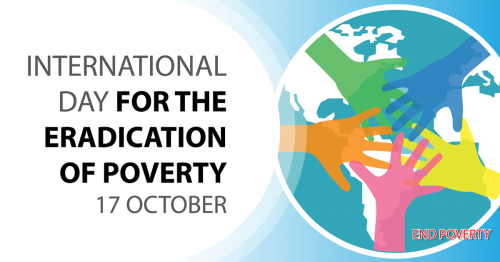
The observance of the International Day for the Eradication of Poverty can be traced back to October 17,1987 when hundreds of thousands of people gathered at Trocadero in Paris, where the Universal Declaration of Human Rights was signed in 1948, to honour victims of extreme poverty. The United Nations writes (see https://www.un.org/en/observances/day-for-eradicating-poverty):
“In a world characterized by an unprecedented level of economic development, technological means and financial resources, that millions of persons are living in extreme poverty is a moral outrage. Poverty is not solely an economic issue, but rather a multidimensional phenomenon that encompasses a lack of both income and the basic capabilities to live in dignity.”
In the Faculty of Dentistry, the links between limited access to dental services and poverty are generally acknowledged. We know that many Canadians pay for dental care out of of pocket due to lack of insurance and that vulnerable populations are much less likely to seek care. But what is the state of the overall oral care in Canada?
Dr. Paul Allison is currently working with Statistics Canada and Canadian Health Measures Survey to gather “information on the oral health and dental care of our population and how these outcomes and services are distributed and evolving over time.” While the objectives of the research are numerous, Dr. Allison says “one of the main goals of the project is to document inequalities in oral health and oral health care and compare them to those observed in the last national survey done in 2007-09.” Published in 2010, this survey found that: “17% of Canadians report that they did not make an appointment to see a dental professional due to cost in the past 12 months”. In another question from the survey, “16% responded that they avoided getting all their recommended treatment done due to the cost in the past year”. (p. 4)
Graduate student, Egle Paschoal, a second year Master’s student supervised by Dr. Christophe Bedos, is working on the Attitudes and Intentions of future dental professionals towards people with disabilities. So why is Egle focusing on this topic and how does it link to poverty? Egle knows Quebec has an aging population and that disability rates increase with age; and that “people with disabilities might have poorer oral health and more dental problems than the rest of the population.” It is hence important to know the attitudes of future dental professionals to analyse their biases and educate them on how to offer dental services to people with disabilities. To obtain data, Egle will be “using an online survey developed by our research team. The target population will be all entering first-year and second-year students in 3 dental professional programs: dentistry, dental hygiene, and dental assistance. 26 schools are offering dental professional programs in Quebec (three, nine, and fourteen respectively for dental medicine, dental hygiene, and dental assistance). Our sample will constitute the entire population.” Egle finally writes: “The results of our research will serve as a guide to promote educational interventions in Quebec dental schools through training, leading to an increase in the accessibility of dental services.”
Persons living in poverty experience many interrelated and mutually reinforcing deprivations that prevent them from realizing their rights and perpetuate their poverty, including:
- dangerous work conditions
- unsafe housing
- lack of nutritious food
- unequal access to justice
- lack of political power
- limited access to health care
It will be exciting to follow the development and results of Faculty researchers to help guide next steps locally, nationally, and internationally and continue to contribute serving marginalized and poorer populations.